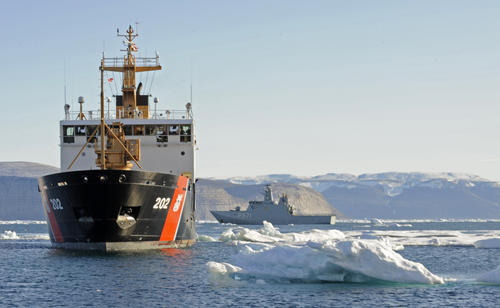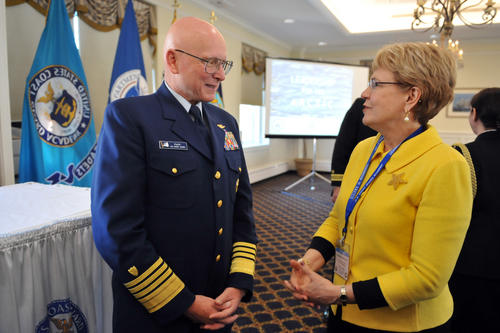Leadership for the Arctic
Posted by LT Stephanie Young, Friday, April 13, 2012

U.S. Coast Guard Cutter Willow transits Nares Strait near an iceberg while a Danish naval vessel follows. U.S. Coast Guard photo by Petty Officer 3rd Class Luke Clayton.
Written by U.S. Coast Guard Academy public affairs.
Warming temperatures have had a dramatic effect on the Arctic recently. Many reports indicate ship traffic through the Bering Strait nearly doubled from 2009 to 2010, and the debut of offshore oil drilling is anticipated in the region this summer. While activities on Arctic waters have been limited, as human activity in that part of the world increases the need for Coast Guard services will increase as well.

Rear Adm. Sandra Stosz, superintendent of the U.S. Coast Guard Academy; Dr. Jane Lubchenco, under secretary of commerce for oceans and atmosphere and administrator of NOAA; and Coast Guard Commandant Adm. Bob Papp listen to a lecture during Leadership for the Arctic at the U.S. Coast Guard Academy. U.S. Coast Guard photo by Coast Guard Auxiliarist Barry Novakoff.
This week the U.S. Coast Guard Academy in New London, Conn., hosted “Leadership for the Arctic” an academic conference covering history, science, marine safety, maritime environmental stewardship and governance challenges for the Arctic region. The two-day event drew leaders from academia, government and industry to the Academy to discuss the emerging issues and share their professional views with those charged with exercising leadership on Arctic policy formulation and implementation in the coming decade.
Addressing participants at the start of the conference Coast Guard Academy Superintendent Rear Adm. Sandra Stosz said, “It is no mistake that the theme for this multi-disciplinary academic conference is leadership, and that is why the Coast Guard Academy is the perfect place to have this important dialogue.”
As the academic institution charged with developing future Coast Guard officers, the Academy was a natural setting to examine an area that will no doubt have significant impact on future Coast Guard operations. “What an amazing opportunity to network and collaborate,” Stosz said, “to get to know each other’s capabilities and align together to change what could be stray voltage into a focused beam of light to guide a future characterized by responsible governance of the Arctic domain.” Stosz continued, “We are standing up a new Center for Maritime Policy and Strategy, and we hope this conference delivers the type of value we want the center to be known for.”
As the conference drew to a close Friday afternoon, Coast Guard Commandant Adm. Bob Papp provided closing remarks summarizing the many challenges ahead. “With the exception of the residents of Alaska, America does not intuitively consider itself an Arctic nation,” Papp said. “So, while there’s a lot of hard work going on – led by many of you in this room – there needs to be a stronger, more comprehensive national focus and effort on the Arctic.”

Dr. Jane Lubchenco, under secretary of commerce for oceans and atmosphere and administrator of NOAA, and Coast Guard Commandant Adm. Bob Papp at Leadership for the Arctic. U.S. Coast Guard photo by Petty Officer 2nd Class Patrick Kelley.
“This summer, we plan to send the National Security Cutter Bertholf up to the Arctic. Bertholf will keep watch over the planned offshore drilling activities and provide many of the same capabilities of a shore-based sector,” Papp added, “including communications and command and control – she also brings the added advantage of serving as a helicopter flight deck and a small boat launch.”
“The Arctic is a national challenge,” Papp continued. “And it requires a whole-of-nation solution. And, what concerns me is that we don’t fall behind on meeting this challenge.
Tags: Bering Strait, CGA, coast guard academy, Coast Guard Commandant Adm. Bob Papp, Sandra Stosz, USCGA











